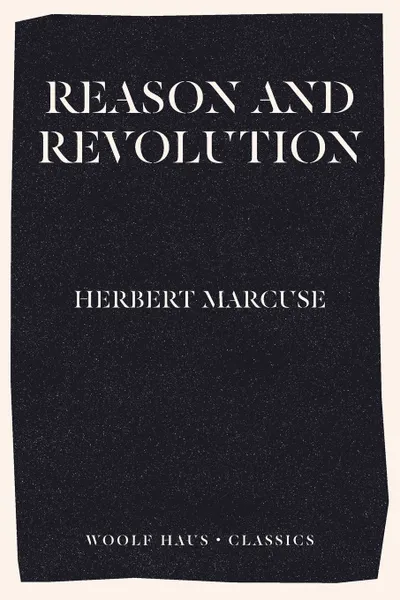Reason and Revolution. Hegel and the Rise of Social Theory
Автор: Herbert Marcuse
2020
Переплёт: Мягкая обложка, 352 страницы
Категория: Научная литература
ISBN: 9781925788594
📕 “Brilliant and penetrating ... the most important work which has opened up an understanding of Marx’s humanism.” — Erich FrommReason and Revolution: Hegel and the Rise of Social Theory is the philosopher Herbert Marcuse’s first major work in English – a masterful interpretation of Hegel's philosophy and the influence it has had on European political thought from the French Revolution to the present day.Reason & Revolution, written in 1941, was the first Hegelian Marxist text to appear in English, the first systematic study of Hegel by a Marxist, and the first work in English to discuss the young Marx seriously. It introduced introduced Hegelian and Marxist concepts such as alienation, subjectivity, negativity, and the Frankfurt School's critique of positivism to a wide international audience. Acclaimed for its profound and undistorted reading of Hegel’s social and political theory, the appreciation of Reason and Revolution has remained high, more relevant now than ever before. There is no better guide than Marcuse to where we have been and to what we might expect.
“In my books, I have tried to make a critique of society — and not only of capitalist society — in terms that avoid all ideology, even the socialist ideology. I have tried to show that contemporary society is a repressive society in all its aspects, that even the comfort, the prosperity, the alleged political and moral freedom, are utilised for oppressive ends.”—Herbert Marcuse, The New York Times Magazine
The most influential radical philosopher of the 1960s, Marcuse’s writings are as relevant to today's society as they were at the time they were written.
“We fell in love with Marcuse’s mind, his method, his scholarship. We read everything he wrote... His book on Hegel and Marx, Reason and Revolution, was high on our list because we wanted to understand the intellectual origins of revolutionary Marxism.” – Dan La Botz, author of A Troublemakers’ Handbook: How to Fight Back Where You Work and Win!
“A Marxian philosopher who became a hero to the student radicals of the 1960s because of his view that modern society has enslaved mankind” – The Washington Post
“A guiding figure to many social activists” – The New York Times
About the author
Herbert Marcuse (1898–1979) was a philosopher, sociologist, and political theorist. He studied at the University of Berlin and the University of Freiburg, and became a crucial figure at the Frankfurt Institute for Social Research, and of the Frankfurt School of social theory. He was forced to leave Germany in 1933, eventually settling in the United States, where he would spend much of his life and taught at many of the country’s greatest schools and universities.
A Hegelian-Freudian-Marxist, Marcuse highlighted the cultural forms of repression and the role of technology and the expansion of the product...
“In my books, I have tried to make a critique of society — and not only of capitalist society — in terms that avoid all ideology, even the socialist ideology. I have tried to show that contemporary society is a repressive society in all its aspects, that even the comfort, the prosperity, the alleged political and moral freedom, are utilised for oppressive ends.”—Herbert Marcuse, The New York Times Magazine
The most influential radical philosopher of the 1960s, Marcuse’s writings are as relevant to today's society as they were at the time they were written.
“We fell in love with Marcuse’s mind, his method, his scholarship. We read everything he wrote... His book on Hegel and Marx, Reason and Revolution, was high on our list because we wanted to understand the intellectual origins of revolutionary Marxism.” – Dan La Botz, author of A Troublemakers’ Handbook: How to Fight Back Where You Work and Win!
“A Marxian philosopher who became a hero to the student radicals of the 1960s because of his view that modern society has enslaved mankind” – The Washington Post
“A guiding figure to many social activists” – The New York Times
About the author
Herbert Marcuse (1898–1979) was a philosopher, sociologist, and political theorist. He studied at the University of Berlin and the University of Freiburg, and became a crucial figure at the Frankfurt Institute for Social Research, and of the Frankfurt School of social theory. He was forced to leave Germany in 1933, eventually settling in the United States, where he would spend much of his life and taught at many of the country’s greatest schools and universities.
A Hegelian-Freudian-Marxist, Marcuse highlighted the cultural forms of repression and the role of technology and the expansion of the product...
Мнения
